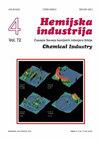水煮、微波和水浴后聚合对丙烯酸义齿树脂力学性能的影响
IF 0.8
4区 工程技术
Q4 ENGINEERING, CHEMICAL
引用次数: 8
摘要
口腔中的丙烯酸修复体暴露在强大的咬合力下。它们的机械性能取决于聚合的类型和方法。本研究的目的是比较分析聚合后处理(水煮沸、微波辐照和水储存)前后丙烯酸材料的力学性能(抗弯强度和弹性模量)。该研究包括假牙基树脂,以及用于正畸器具的丙烯酸酯浸渍美学珠子。分别在聚合后立即、热聚合后和微波聚合后以及在37℃水浴中浸泡后测量抗弯强度、弹性模量和挠度。应用后聚合方法导致相对于所有测试材料的初始值的弯曲强度和弹性模量的增加。考虑到聚合后处理可以降低义齿骨折的风险,它可以用于所有义齿损伤风险增加的临床情况。本文章由计算机程序翻译,如有差异,请以英文原文为准。
Effects of water boiling, microwave, and water bath post-polymerization on mechanical properties of acrylic denture resins
Acrylic restorations in the mouth are exposed to strong occlusal forces. Their mechanical properties depend on the type and method of their polymerization. The aim of this study is a comparative analysis of mechanical properties (flexural strength and modulus of elasticity) of acrylic materials before and after the post-polymerization treatments (water boiling, microwave irradiation and water storage). The study included denture base resins, as well as an acrylate for orthodontic appliances impregnated with aesthetic beads. Flexural strength, modulus of elasticity and the deflection were measured immediately after polymerization, after a hot and microwave post-polymerization and after immersion in a water bath at the temperature of 37 °C. The applied post-polymerization methods resulted in an increase in flexural strength and modulus of elasticity relative to the initial values for all tested materials. Being aware of the reduction in fracture risk of dental prosthesis after a proposed post-polymerization procedure, it could be used in all clinical situations where there is an increased risk of damage to dentures.
求助全文
通过发布文献求助,成功后即可免费获取论文全文。
去求助
来源期刊

Hemijska Industrija
工程技术-工程:化工
CiteScore
1.60
自引率
11.10%
发文量
12
审稿时长
6-12 weeks
期刊介绍:
The Journal Hemijska industrija (abbreviation Hem. Ind.) is publishing papers in the field of Chemical Engineering (Transport phenomena; Process Modeling, Simulation and Optimization; Thermodynamics; Separation Processes; Reactor Engineering; Electrochemical Engineering; Petrochemical Engineering), Biochemical Engineering (Bioreactors; Protein Engineering; Kinetics of Bioprocesses), Engineering of Materials (Polymers; Metal materials; Non-metal materials; Biomaterials), Environmental Engineeringand Applied Chemistry. The journal is published bimonthly by the Association of Chemical Engineers of Serbia (a member of EFCE - European Federation of Chemical Engineering). In addition to professional articles of importance to industry, scientific research papers are published, not only from our country but from all over the world. It also contains topics such as business news, science and technology news, information on new apparatus and equipment, and articles on environmental protection.
 求助内容:
求助内容: 应助结果提醒方式:
应助结果提醒方式:


